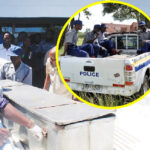While the self-styled prophet frames the spectacle as an effort to “expose fake prophets” and combat ritual violence, critics argue that the stunt is a calculated distraction from the country’s escalating political and socio-economic crises.
During a live broadcast on his YouTube channel on Wednesday, March 5, Makandiwa emphasized that this is not a game but a serious spiritual test of prophetic accuracy. He condemned rogue prophets and witch doctors who “manipulate people into heinous acts, like killing children for rituals,” asserting that the challenge aims to reveal the truth.
“This is to show the world that no one can predict things with 100% accuracy,” Makandiwa said during the broadcast. “It is not about money at all,” he stated. “This is an experiment to save lives and expose falsehoods. Churches have focused too much on theory and neglected practicals. This exercise will open hearts, rebuke spirits, and expose rituals.”
“We need your name. Your proper name,” Makandiwa explained. “I understand that sometimes, as prophets, we end up getting different names that are not on our proper identification documents. It is important that you register using your proper name and that you come on Sunday. You also need to bring your ID. This is going to help us; remember there’s money, there’s payment involved in this.”
Makandiwa assured participants that they would not be required to pay anything, saying: “You’re not going to be paying anything. You’re not going to be losing anything.”
On the day of the challenge, participants must adhere to strict rules: entering through the main entrance, introducing themselves using their real name and presenting their ID for verification, and proving their prophetic ability by correctly identifying a concealed object in Makandiwa’s pocket.
In a moment of candour, Makandiwa admitted that even he is not always 100% accurate, questioning why people fully commit to any prophet. “If I were to participate, I know I would miss because no one sees everything,” he confessed.
However, political analysts have accused Makandiwa of exploiting spiritual rhetoric to shift public attention away from urgent national challenges.
“Zimbabwe is grappling with hyperinflation, unemployment and a crumbling healthcare system,” said Pardon Taodzera, a political analyst. “Yet here we have a high-profile religious leader turning serious discourse into a circus.”
Taodzera added, “This contest is a smokescreen. While people are mesmerised by prophetic theatrics, leaders evade accountability for failing to address poverty and corruption.”
Another analyst, Aaron Hamauswa, criticised the timing of the challenge, highlighting the irony of flaunting a US$1 million prize in a country where over 60% of the population lives below the poverty line. “Offering such an exorbitant sum — amid rampant unemployment and currency instability — is tone-deaf,” he argued. “It perpetuates a culture of exploitation, where vulnerable citizens are lured by financial miracles rather than demanding systemic solutions.”
Critics also warned that the event risks emboldening, rather than curbing, predatory religious practices. “Public challenges like these could incentivise extremist claims from fringe figures seeking clout, further endangering gullible followers,” said governance expert Tinashe Chikara. He cited recent reports of ritual killings linked to fake prophets, asking: “Will a monetary showdown truly dismantle these networks or merely amplify their notoriety?”
While some citizens praised Makandiwa’s “courage to confront falsehoods”, others expressed scepticism. “How does guessing what’s in a pocket help struggling families to afford bread?” asked Harare vendor John, who added: “We need jobs, not prophecies.”
This is not the first time Makandiwa has faced scrutiny. His church has previously been accused of hoodwinking followers into making excessive financial donations, promising “miraculous debt relief”.
Tabernacle of Christ Church leader Archford Mhango urged citizens to focus on pressing governance issues. “Religious leaders have a role in moral guidance, but not as substitutes for tangible policy action,” Mhango said. “Zimbabwe’s crises demand transparency and reform, not distractions wrapped in spirituality.”
Maswerasei adds that all this was pre-planned to hoodwink masses into paying attention to his prophetic challenge nonsense.
He says this is psychological game for public to be dunked in the charade – first denounce ED.
“Dear Zimbabwe | Ignore these counter-intelligent sideshows crafted to divert your attention from the most important issue. The failed, petrified, naked, cornered & desperate Emperor had to find something to get you hooked onto. Murikuitiswa – the pressure was becoming unbearable,” he says.
In 2022, Makandiwa turned his church sermon into a praise show for Mnangagwa who was in attendance. Mnangagwa together with his deputy Constantino Chiwenga had attended the Easter conference at the newly-built gigantic church in Chitungwiza. Makandiwa declared his love for Mnangagwa’s leadership, describing him as a God-fearing president who is an embodiment of love and unity.
In 2021, Makandiwa and his wife, Ruth, were sued for millions of dollars by a Harare couple over alleged “fake prophecies, fraud and defamation”. The couple wanted Makandiwa to repay them US$5,6 million that it allegedly gave as tithes and other donations when it was still a member of the church.
Adding to the controversy, in February 2014, a group of pastors from Ghana accused Makandiwa of being a trickster using occultist powers and charms to draw record crowds to his church.
As Zimbabweans grapple with pressing economic and political challenges, the debate surrounding Makandiwa’s prophecy challenge highlights the complex relationship between religion, politics, and society in the nation. Whether a genuine attempt to expose falsehood or a calculated distraction, the challenge has undoubtedly captured the attention of the nation, raising questions about the role of religious leaders in addressing the country’s pressing issues.












